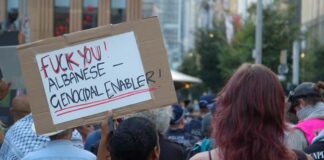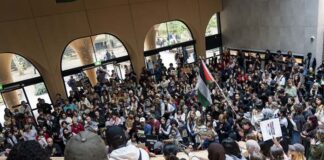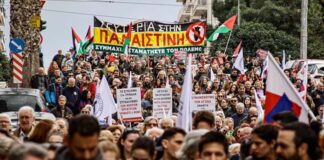For Palestinians, who are every day humiliated both by Israel and by their own “regime”, the reassertion of dignity by the Tunisian, Egyptian and Middle Eastern masses continues to be a great inspiration.
As people saw the fall of Mubarak, spontaneous marches began in East Jerusalem, and in Palestinian cities within 1948 Israel. In the Gaza Strip, where 1.6 million people are suffering not only from the tightened Israeli siege, but also from Egypt’s closure of the Rafah border, celebration marches took place in cities, and in the larger refugee camps. Hamas, which governs Gaza, welcomed the downfall of Mubarak, voicing optimism that the border would quickly open.
In Ramallah in the West Bank, Palestinian NGOs called the first demonstration in solidarity with the Egyptian people of 1000 participants on February 5. In recent years protests have been forbidden by the Palestinian Authority (PA), which controls the West Bank with US and Israeli backing. This rally was only approved at the last minute.
The chants were about solidarity with those in Tahrir square. Then later some dared to chant: “the PA is CIA” and “the people want to get rid of Oslo”, the failed peace process. Later, seven of the young men who led these chants were arrested and beaten up by the PA’s USA-trained security forces.
A further demonstration was called by Palestinian NGOs on February 17. Ostensibly this was about calling on Fatah and Hamas to re-forge national unity against the Israeli Occupation, but its underlying dynamic was anti-PA. On March 15, large demonstrations, again led by youth, calling for national unity, were held in both West Bank and Gaza cities. Some are calling for elections for the Palestine National Council, the body established in the 1960s to lead the national liberation struggle, which can represent Palestinians not just in the Occupied Territories, but also inside Israel, and the millions of refugees elsewhere.
Political impasse
The electoral mandate of President Abbas and Prime Minister Salam Fayyad, to the extent they had any, expired in January 2009 when new elections were due. Although he lost the last election in 2006 to Hamas, Abbas led a coup to hold onto power with USA and Israeli support.
As in past years, Abbas has called for elections in September. But the conditions for free and fair elections, such as in 2006, no longer exist in the PA or Hamas administered West Bank and Gaza, nor in Israeli-annexed East Jerusalem.
Fatah and the PLO have atrophied and melded into the PA, representing 20 business families, a small comprador class based in Ramallah, and the interests of Israel and the USA. Their CIA-trained security services are used to manage resistance for Israel.
Although the Hamas administration in Gaza is regarded as clean, and their performance in service-delivery, such as in health and schools is markedly better than the PA, the life-line of the tunnel imports is wearing thin.
With the possibility of a democratic Egypt, and even a democratic Jordan, Israeli leaders are panicking. The life expectancy of Israel’s collaborator Palestinian Administration seems seriously threatened.
The PA administers disconnected Palestinian cities and towns on only 40 per cent of the West Bank. The majority of the West Bank land, 80 per cent of the water resources, the economy, and all borders and checkpoints remain under Israeli control. The “Palestine Papers”, leaking details of negotiations with Israel, have removed any doubts Palestinians had in the treachery of the PA. They showed its leaders begging for some “fig-leaf” to distract attention from their surrender of Jerusalem, the refugees, the prisoners, and an independent state on enclaves of land in the West Bank. The PA, through co-option and outright repression, has ensured until recently a depoliticised public life in the West Bank. People are just trying to survive and relying on their families.
The vast scale of the expansion of illegal Israeli settlements, at a time when USA-allied regimes across the region are under popular attack, poses a crisis for the PA. PM Fayyad is threatening the declaration of an independent state on all the land occupied in 1967, hoping to gain support in the UN General Assembly. But such a declaration, similar to that made by Arafat in 1988, won’t end the occupation.
The Oslo process and the mirage of a “two-state” solution has reached its dead end. There is a global paradigm-shift towards the campaign to isolate Israeli Apartheid, and for an egalitarian bi-national state. This shift is underlined by the changing demographics, with 5.7 million Jewish Israelis no longer constituting a majority of people under Israel’s control between the Jordan River and the Sea.
In the context of solidarity actions with the democratic intifada across North Africa and Middle East, international efforts for boycott, disinvestment and sanctions against Israel need to be reinforced. Palestine remains the fault-line between the Arab masses and colonialism.





